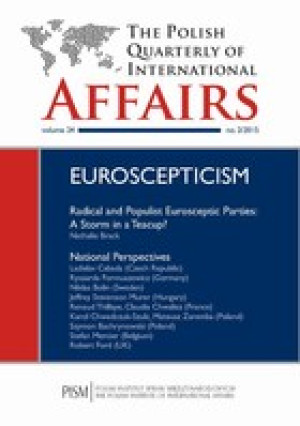
The Polish Quarterly of International Affairs nr 2/2015
Producent: Polski Instytut Spraw Międzynarodowych
The Polish Quarterly of International Affairs nr 2/2015 PRACA ZBIOROWA Articles Nathalie Brack Radical and Populist Eurosceptic Parties at the 2014 European Elections: A Storm in a Teacup? The integration process has now entered a new and more difficult phase characterised by mass Euroscepticism and the rise of radical and populist parties. Against the backdrop of the economic crisis, Euroscepticism has become increasingly mainstreamed in the sense that it has become increasingly more legitimate and salient, and in many ways less contested, across Europe. The European elections in May 2014 attest to this trend. Claims of the EU`s non-democratic nature and the need for major reforms have become commonplace among mainstream parties, and this context has provided particularly fertile soil for Eurosceptic players. This introduction first briefly examines the complex nature of Euroscepticism before turning to an overview of the success of populist and right-wing Eurosceptic parties at the 2014 elections. Then, it discusses the lack of influence of these parties in the EP despite their electoral success. Last, the articles included in this issue of The Polish Quarterly of International Affairs are briefly introduced. Ladislav Cabada From Eurogovernmentalism to Hard Euroscepticism Genesis of the Czech Liberal-Conservative &Anti-EU Stream An analysis of the development and programmatic standpoint of the Czech liberal-conservative political stream. The article uses the concept of Euroscepticism as presented in the works of Szczerbiak and Taggart, and Kopecký and Mudde as the theoretical framework and develops this concept based on Petr Kaniok`s new typology. In the first part of the analysis is a discussion of the development of the Eurosceptic faction within the Civic Democratic Party (ODS) and changes in the party`s position towards the EU. It also lends understanding to the Eurosceptic faction within the ODS, with Václav Klaus as its supporter and think tanks related to him, as the incubator for the establishment of the Party of Free Citizens (SSO) in 2009. In the second part of the analysis, the focus is on the party`s programme and its position within the European political arena. The analysis also includes a discussion of the most visible proclamations of the party leaders against the EU and the European integration process. The analysis is framed with the general debate about the liberal-conservative party family and its development at the EU level. Ryszarda Formuszewicz Heading for New Shores with Mutiny on Board: The AfD in the European Parliament The AfD`s performance in the European Parliament reflects its status as an absolute beginner. Not only is the party a newcomer on the European stage but it also has only been in existence for two years. The party has managed formal integration as a political group of its choosing, but it is not enough to become a fully-fledged member of the ECR. Internal quarrels concerning AfD`s ideological positions will foster its image as a controversial party. Such confrontations are nothing unique at the early stage of a new party, but if the competition between the wings escalates it will shatter the party`s federal reach, or even sink it completely. Niklas Bolin A Loyal Rookie? The Sweden Democrats First Year in the European Parliament In the 2014 election, the Eurosceptic and anti-immigration Sweden Democrats (SD) for the first time entered the European Parliament. The article first sheds light on the question of why the SD ended up in the EFDD parliamentary party group with a discussion of both the history of the party and its stance on some of the most important issues. In order to assess what inclusion in the EFDD has meant in regard to its behaviour, analysis of roll call data is presented. The results indicate that the SD tends to vote similarly to UKIP. Moreover, and surprisingly, the coherence between the SD and the Danish People`s Party is very low, indicating that group membership is more important than political affinity for the SD in deciding on its voting stance in the EP. Jeffrey Stevenson Murer The Rise of Jobbik, Populism, and the Symbolic Politics of Illiberalism in Contemporary Hungary Following the economic crisis of 2007-2008, Hungarian politics turned dramatically to the right. In addition to the sweeping 2010 electoral victory of a two-thirds majority by the Fidesz party, a relatively recent upstart party, Jobbik, further yet to the right of Fidesz, also had a strong showing. This article explores the rise of Jobbik from deep nationalist, anti-Semitic and anti-Roma currents in Hungarian symbolic politics dating back to the last years of the 1980s and the early days of the 1990s. In its current form, Jobbik is more than a political party; through its direct action affiliates, its members engage in physical politics beyond the ballot box through acts of intimidation and violence. With its claims that it opposes liberalism, global capitalism, and Zionism, Jobbik is the face of a new illiberal politics in
Sklep: gandalf.com.pl
Cena:
18.99
18.23
Przejdź do sklepu